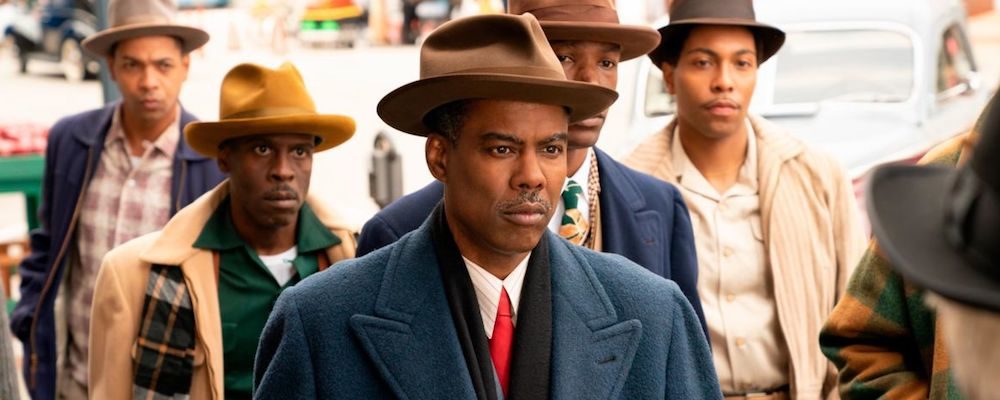In ‘Fargo’ Season 4, Chris Rock Leads a Violent Gangland War in a Saga About 1950s America
Alci Rengifo
The fourth season of “Fargo” returns to that rich well of the immigrant experience and American crime. Filmed in sensuous tones, it’s a slow burner about gang warfare in 1950s Kansas City, but its true theme is the edgier side of assimilation. Because “Fargo” is an anthology series, and not a direct adaptation of its original inspiration, the 1996 Coen Brothers’ classic movie, we are free to enjoy this new storyline purely for what it is.
Crime epics must begin with long family histories, and so “Fargo” does just that in the two episodes that open the season, “Welcome to the Alternate Economy” and “The Land of Talking and Killing.” Providing narration is Ethelrida Smutney (Emyri Crutchfield), a high schooler challenging the watered down version of American history spoon fed in class. She goes over the long history of organized crime in Kansas City, starting with the first mob fronts made-up of Jewish immigrants, then the Irish came in, followed by the Italians. Ethelrida is now living the latest incarnation of shifting crime waves as Black mobsters, represented by Loy Cannon (Chris Rock), are staking their claim. To keep the peace the mafia clans have devised a custom of exchanging sons, literally. So now the dominant Fadda Family must make an exchange with Cannon’s crew, The Cannon Limited. Fadda gets Satchel Foy (Rodney Jones) while the Cannons take in Zero Fadda (Jameson Braccioforte). There’s peace for about a year but it’s beginning to get shaky, especially since Josto Fadda (Jason Schwartzman), right hand to his Don of a dad, Donatello (Tommaso Ragno), doesn’t like Cannon, or Blacks in general. Yet both groups are despised anyway by the local WASP elite. This becomes even more apparent when Donatello is shot in a freakish accident, not only sending him to the hospital, but threatening the peace.
There are countless shows about gangsters and hoods from different sections of the American ethnic chart, but “Fargo” does not feel like a retread because the theme is much richer. One of the tragic ironies of minority groups attacking each other is that they both live under the same boot from the same social elite. When Ethelrida narrates the history of Kansas City from the dawn of the 20th century to the 50s, the emphasis is on how Jewish, Italian, Irish and Black underworld figures were formed out of a discriminatory system. That’s not to say organized crime should be excused, but the show goes to the question of “why” tribal underworld formations take place. The Irish and the Jews were racist towards each other, and now in 1950, the Italians look down at the Black Americans. Of course, the greatest irony here is that in a sense, Cannon’s gang are the only authentic Americans in this whole standoff. There’s a strong scene where Cannon tells Donatello they are both part of the same, discriminated grouping. At the time there were signs refusing service to Black Americans and Italians. When Donatello is rushed to the hospital after being shot, a private hospital rejects him for being Italian, because only the public hospital is deemed fit for the immigrant underclass.
Approached as a show this is a handsomely mounted production, with rich sepia tones reminiscent of the Coen Brothers’ own “Miller’s Crossing.” Showrunner Noah Hawley is still pursuing a slow burner style similar to shows like “Better Call Saul” or “Mr. Robot,” where dialogue and passive cameras are preferred to action or energy. The opening of the season is however, quite bloody because a whole maze of characters are established, like Rabbi (Ben Whishaw), who was given over by the Jewish Moskowitz Syndicate to the Irish Milligans, but then turned on them to help the Faddas ascend to power. Just go with the flow, it will all eventually sort itself out as the season progresses, we hope. Ethelrida is a strong teen character, smart and lacking naivety. She is connected to all this carnage directly, because her parents, Thurman (Andrew Bird) and Dibrell Smutney (Anji White), are a mixed couple who own the local funeral parlor. So they provide caskets for all the latest gangland deaths. Then she comes home one night and sees Cannon joining her parents at the dinner table. Why will be revealed later. The same goes for an enigmatic nurse, Nurse Oraetta Mayflower (Jessie Buckley), who snorts drugs with Josto at the hospital where Donatello is being kept, then proceeds to carry out a deadly twist of an act sure to also take on more meaning later.
Cannon himself is a fascinating character. Chris Rock drops any hint of his iconic, comedic persona to play a focused, serious thug also trying to be a groundbreaking businessman. One of his best scenes has little to do with mafia intrigue. Instead, it takes place inside a bank, where Cannon and his associate, Doctor Senator (Glynn Turman), try to sell a white banker on the idea of credit cards. This is also a moment of sneaky satire as the banker not only refuses, but states pompously that putting people deep into debt is not something a good, honest American bank would ever do.
This fourth season of “Fargo” sets up an intriguing new world shot in nostalgic tones. But as this show continues to deliver strong anthology seasons, it is refreshing to see it tackle new approaches to familiar topics. Crime will surely be a key motivator, but it’s not the point. It’s more about how we all, criminals or not, don’t often realize how we tend to be on the same boat.
“Fargo” season four premieres Sept. 27 and airs Sundays at 10 p.m. ET on FX.

